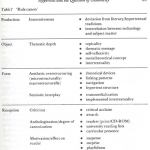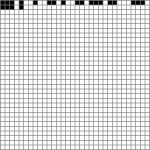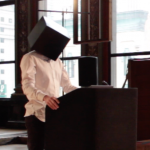An Emerging Canon? A Preliminary Analysis of All References to Creative Works in Critical Writing Documented in the ELMCIP Electronic Literature Knowledge Base
Scott Rettberg
Scott Rettberg's essay, "An Emerging Canon?", highlights the potential for macroanalytic approaches to literary study, specifically in the field of electronic literature. Through his study of the richly populated ELMCIP Knowledge Base, Rettberg analyzes the impact that specific works have had within scholarly and creative communities, and enumerates the potential benefits that this work might have for the preservation, study, and understanding of the field.
Speculative Aesthetics: Whereto the Humanities?
Maria EngbergMaria Engberg reviews two books that describe the dialectical relationship between literary production, digital media, and literary reception from opposite ends of the historical and aesthetic spectrum. "Literary paleontologist" C.T. Funkhouser examines the born-digital poetry of the 1950s (and earlier), while Johanna Drucker writes an eye-witness account of the contemporary encounter between print literature, humanities research, and "speculative computing."
Internet radio and electronic literature: locating the text in the act of listening
John F. BarberIn this ambitious piece, which was initially presented at the 2013 Paris meeting of the Electronic Literature Organization, John Barber examines the role of sound in born digital literary works. Identifying, initially, the rich history of sound art and radio drama, Barber goes on to probe the untapped potential of digital audio as a field for future development. Anticipating John Cayley's 2018 essays on Aurature in electronic literature, Barber in this essay sees sound moving into the foreground of a transformed literary experience, rather than just augmenting text based literary acts.
Digital Humanities in Praxis: Contextualizing the Brazilian Electronic Literature Collection
Luciana GattassIn the following essay, Luciana Gattass discusses the formation of a Brazilian Electronic Literature Collection via analysis of works identified in the ELMCIP Knowledge Base. Positioned between the existence of geographical data and the question of a national literature, Gattass considers the role of the human critic in the age of big data.
E-Literary Text in the Nomadic Cockpit
Janez StrehovecIn this essay, Janez Strehovec explores the literary from the “nomadic cockpit” everyday life in the 21st Century. More than merely being cocooned by screens, Strehovec’s metaphor describes the way in which our travel through the environment is layered with navigational data, environmental surveillance, communication systems, and tied into a dynamic feedback loop. From this vantage point, Strehovec considers a number of works of digital art and electronic literature that are written precisely to be read in motion, to explore the sensations of life in the nomadic cockpit.
One + One = Zero – Vanishing Text in Electronic Literature
Marjorie C. LuesebrinkIn “One + One = Zero,” Marjorie C. Luesebrink discusses “fleeting” messages and their implications for electronic literature. Beginning with a discussion of the popular social media app, Snapchat, Luesebrink considers a series of works of electronic literature that employ tropes of vanishing and inaccessibility to represent forgetfulness, limited perception, and the challenges posed by dynamic environments for contemporary readers. After tracing a path through two decades of digital practice, Luesebrink points to a future in which the vanishing text will continue to be a relevant site for literary innovation.
Reading the Wind
David (Jhave) JohnstonIn his video-poem "Reading the Wind," Dave (Jhave) Johnston identifies the current environment for electronic literature, and in doing so, claims the impossibility of knowing its future.
Histories of the Future
Patrick LeMieux
For Patrick LeMieux, the future of electronic literature is not before us, and instead entails an investigation of the past--of the unknowable territories we collaborate with through e-lit.
The Ode to Translation or the Outcry Over the Untranslatable
Natalia Fedorova
Natalia Fedorova claims sees the future of electronic literature in translation: just as translation from her native Russian to English can teach us about both of those languages, translations between "natural languages" and "languages of code" can clarify what makes electronic language literary.
dELO: Affordances and Constraints
Samantha GormanCommenting on the high price of long term literary collaboration (and the brevity of most funding in the Humanities), Samantha Gorman asks if it's necessary for arts practitioners today to create commercial start-ups. Can scholars and Digital Language Arts entrepreneurs find a way to bring literary work into "hybrid communities" and "outreach"?
Who’s Left Holding the (Electrical) Bag? A Look to See What We’ve Missed
Ben BishopRecalling ebr's early exploration into "green" and "grey" ecologies, invisible etchings on silicon and massive environmental consequences, Ben Bishop calls our attention to questions of "power" at the heart of our newly digitized critical and creative practices: "Not clout or capability, but electrical power generated by spinning turbines."
A Tag, Not a Folder
Ian Hatcher
The "electronicness" in literary writing, Ian Hatcher suggests, is more of a cognitive disposition, an atmosphere or condition that is present regardless of the print/screen/pen(cil)/paper medium one inhabits.
